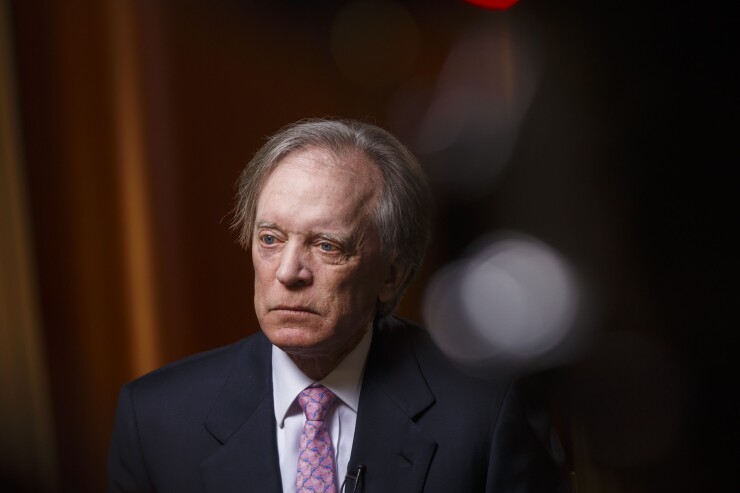U.S. markets are at their highest risk levels since before the 2008 financial crisis because investors are paying a high price for the chances they're taking, according to Bill Gross, manager of the $2 billion Janus Henderson Global Unconstrained Bond Fund.
"Instead of buying low and selling high, you're buying high and crossing your fingers," Gross said.
Central bank policies for low-and negative-interest rates are artificially driving up asset prices while creating little growth in the real economy and punishing individual savers, banks and insurance companies, according to Gross.

The U.S. economy is expected to grow 2.2% this year and 2.3% in 2018, according to forecasts compiled by Bloomberg. Trump administration officials have said their policies will boost annual growth to 3%.
Despite being concerned about high asset prices, Gross said he feels required to stay invested and sees value in some closed-end funds. Examples he gave are the Duff & Phelps Global Utility Income Fund and the Nuveen Preferred Income Opportunities Fund. He also said he has about 2% to 3% in ETFs to get yield and add diversification.
-
There are two that hold stocks that have boosted dividends for 20 years or more.
July 17 -
The positive net flows of U.S. mutual funds was driven by taxable bonds.
July 5 -
How new competing international and small-cap ETFs stack up.
June 12
"They're appetizers, not entrées," he said.
Gross's fund has returned 3.1% in the year through June 6, outperforming 22% of its Bloomberg peers. It has posted a total return of 5.4% since Gross took over management in October 2014 after he was ousted from Pimco.
Fixed-income yields may feel low, but foreign investors facing negative yields at home are making the U.S. markets popular.
"If there's a common factor it's the expansion of credit," Gross said. "And the credit that's being generated by central banks. Money is being pumped out into the system and money that is yielding less than nothing seeks a haven not only in bonds that are under-yielding but in stocks that are overpriced."
Gross said in the current environment "you basically tell your investors that it's a changed world, that returns are going to be lower and that if you want to sleep at night, to accept the market as it is. Low volatility requires low returns."
Janus Capital and Henderson completed a merger May 30 to form Janus Henderson, creating a global investment manager overseeing more than $330 billion. It seeks to use its combined size to compete with lower-fee rivals, such as Vanguard, at a time when costs are rising for compliance and technology.
Gross said the merger will help his fund since Henderson will add to asset growth.






